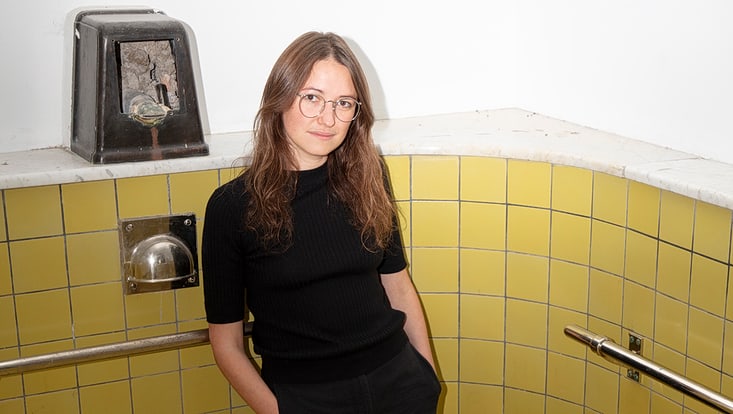Anastasia Kubrak, M.A.

Photo: Herbert Weber
Curriculum
Anastasia Kubrak is a PhD candidate at the Critical Media Lab at the Basel Academy of Art and Design FHNW and the University of Arts Linz. Her current research revolves around lithium, both as a medical substance and as a critical raw material in the EU’s ongoing energy transition. Between 2018 and 2021, she worked as a researcher at the Nieuwe Instituut in Rotterdam, where she co-curated the exhibition ‘Lithium’ (2020) and co-edited the publication ‘Lithium: States of Exhaustion’ (2021) with Francisco Diaz and Marina Otero Verzier. Since 2018, she has been teaching in the MA Social Design at the Design Academy Eindhoven, and she also taught in MA Transversal Design at the HGK Basel. She holds an MA in Design from Sandberg Instituut (2018) and cum laude BA from Design Academy Eindhoven (2016). She is a co-founder of aHOUSEforHOME, an architecture and urbanism school for displaced Ukrainian teenagers in the Netherlands. Her artistic work has been exhibited at venues including Venice Architecture Biennale 2023, Bureau Europa and Municipal Gallery Porto, and her writing has been published by Valiz, ARCH+ and The Institute of Network Cultures among other platforms. Her research interests include environmental media, infrastructure imaginaries, cultural studies of medicine and visual practices of counter-documentation.
Publications (selection)
- ‘Fears of Exhaustion, Dreams of Resilience: The EU’s Critical Raw Materials Act and the Cínovec Lithium Deposit’. With Johannes Bruder in Digital Exhaustion: Burnout, Fatigue and Overload in the Age of Constant Connectivity, edited by Linda Kopitz, Alexander Kviat, Alexander R.E. Taylor and Yigit Sonsul. Intellect Books, forthcoming 2026.
- ‘Là où il n’y a rien à voir : les fantômes lithinifères de la Bohême’ [‘Nothing to See, or Bohemian Ghosts of Lithium’]. Les Temps qui restent, no. 4 (2025).
https://lestempsquirestent.org/fr/numeros/numero-4/la-ou-il-n-y-a-rien-a-voir-les-fantomes-lithiniferes-de-la-boheme - ‘From Burn-Out to 7UP: On Bathing and Mining Grounds’ in Lithium: States of Exhaustion, edited by Francisco Diaz, Anastasia Kubrak and Marina Otero Verzier. Ediciones ARQ and Het Nieuwe Instituut, 2021.
- Lithium: States of Exhaustion, edited by Francisco Diaz, Anastasia Kubrak and Marina Otero Verzier. Ediciones ARQ and Het Nieuwe Instituut, 2021.
Research project: Lithium. On Bathing and Mining Grounds, 1817–1914 and 2015–2024
My practice-based PhD research focuses on the history of lithium, both as a critical raw material in the EU’s ongoing energy transition and as a medical substance used to treat mania and exhaustion since the late nineteenth century. The project documents the prospective lithium extraction sites in Europe, where practices of bathing, drinking and mining minerals have been historically intertwined. Departing from a case study of Cínovec, located on the border between Germany and the Czech Republic, I elaborate on the current EU policies of ‘onshoring’ the mining of critical raw materials onto European grounds (Riofrancos 2023). Combining archival research, fieldwork and embodied methods (such as collective bathing in lithium waters) my project is positioned at the intersection of media studies, cultural history, STS and artistic research. I follow lithium as an elemental medium and a substance (Dumit 2021) and document infrastructures and imaginaries surrounding the element between the nineteenth century and today.
During the fellowship, I will focus on translating the dissertation into an artistic book manuscript, structured around the operational media that render lithium into a measurable resource: from geological maps and 3D deposit models to postcards and medical spa brochures. Drawing on conversations and collaborations with local institutions and anti-mining activists, the publication will comprise a ‘counter-document’ that opposes extractive policies and elaborates on artistic strategies of resistance.
